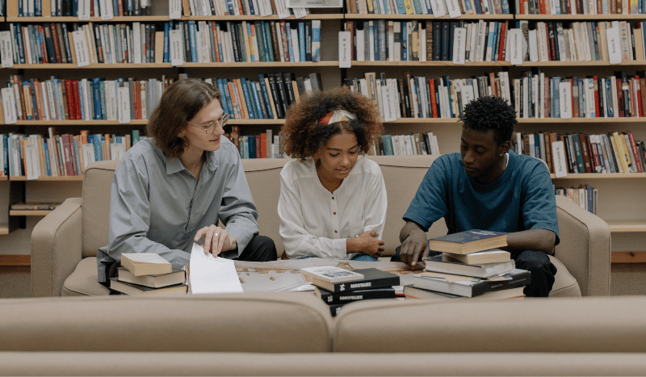The study cycle is a tried and true way of retaining information and developing a complete understanding of a course. When moving to a new country, and learning a new language it can be hard to understand the course structure, and even harder to develop a study routine. The goal of a study cycle is to add structure to your already hectic schedule. By carving out time in your daily life, to study you can then effectively learn the material. So let's take a look at what the study cycle is, and some ways we can use and modify it to fit your needs when you are abroad.
Step One: Preview The Course/ Materials
Before classes take the time to go over all materials such as powerpoints, readings, or review assignments due that week. If you have any questions about the material, write them down and have them ready for class. Meeting with your professors can also be a great way to go over materials. Learning a new language and culture can be hard, so taking the first step of connecting with your professor and getting ahead of the work will help you not feel so overwhelmed down the road.
Being organized going into the semester is essential to success when using the study cycle. There is a very quick turnaround time between leaving your home and landing in a new country, so being able to visually see your schedule and courses laid out in front of you can help alleviate some stress, as well as already being aware of the work that is expected for the course.
Every country and professor and even school all have different ways of conducting classes, and this can be a huge adjustment to studying skills and can mess up an overall schedule. By previewing your courses and materials you are setting yourself up for success for when it's time to sit in the classroom. Setting goals for yourself to work hard and do your best in a way that works best for you is the most important part of preparing and will help you succeed in the next step of the study cycle

Step Two: Attending Class
Now that you have all your materials organized and you know what to expect from the course, it's important to take the next step and utilize this information. Attending class is not only a part of your overall grade but what you do in attendance of the class can dictate the overall grade you get in the class. When in attendance of the class having your previous notes accessible and questions ready to go, can help you actively engage with your professor and the materials you need to know.
Many studies have shown that handwriting notes help you retain the information better and that blue or maybe even green colored ink is the best for retaining the information you are writing down. When taking these notes don’t just write what the PowerPoint shows on the board but pay attention to what the professor is putting an emphasis on, this quill more than likely be essential for assignments and possibly questions on exams. Put notes into your own words, jot down any acronyms that can help you later, and don’t be afraid to write all over the paper studying notes don’t have the be beautiful, just make sure they are legible.
The second way that you can actively engage in class is to sit with someone you don’t know or someone who speaks the language you are trying to learn. They will be able to offer you more insight into how students study and the expectations for the course and can introduce you to resources around the city.

Step Three: Review Materials
This third step is an important part of developing a study pattern and can be a really good habit to develop when studying. Go over your materials again, find if there are still many gaps you have in knowledge, and talk to your professor or classmates about it while it is fresh in your mind. This step does not require you to sit down for hours and analyze your notes before bed, but it should be a quick overview to develop any questions you still need help with or take that extra second to talk over a theory with a classmate.
Many studies have recommended re-writing your notes out again to help further drive that information into your brain, and also to help with memorization. When you are studying abroad you will often have downtime when riding on transportation, and this is a perfect time to pull up your notes and go over them again at different points to keep the information in your head. Being organized is a very important part of the study cycle, and it doesn’t need to be done one way or another. While reviewing materials try using different techniques for taking notes to see what helps you retain the information. By setting this foundation for yourself you are setting yourself up for success when the long study sessions are needed.
Some popular ways of setting up notes to study are to make flashcards and separate them into three categories: Mastered, still need work, and no idea. By breaking them into three categories you are able to put more focus on information that you don’t know as well. Everyone has a different way of studying that works best for them, the study cycle is a perfect outline for setting yourself on a schedule and setting yourself up for success.

Step Four: Take A Break & Refuel
Studying for long hours can take a mental toll on your mind and your body, so having a break or giving yourself rewards for completing chapters can help break up the studying into smaller and more tolerable hours. When interning or studying abroad it can be a big change for many and it can be very overwhelming when you also are taking courses. To reduce stress from this big change, take an hour for yourself and don’t forget to fuel your mind and body.
Refueling your body with healthy snacks is very important when you are studying or under a lot of stress. Having these study snacks can be a great way to keep your mind and body ready to tackle the books.
- Mixed Berries- Amazing in smoothies and an easy snack to find at local markets all around the world, they also are thought to contain components that help increase brain performance.
- Dark Chocolate- This sweet treat can be a perfect reward for studying flashcards or finishing a long chapter. Dark chocolate has long been linked to improvement in brain function, mental clarity, and improved blood flow to the brain. This yummy treat can also include chocolate-covered berries for the ultimate sweet study treat.
- Nuts & Granola- Another easily accessible treat around the world is nuts and granola. These snacks are chock full of protein, healthy fats, and fiber all needed when you are studying for long hours, or if you are constantly on the go in a new city.
All of these quick snacks are perfect for keeping your body fueled all day long for studying or for working long hours, but the most important part is taking a break. Brain fatigue is something that happens to us all when we overload ourselves with too much work. The study cycle includes a break because once your body is in fatigue the learning process is not as successful and can potentially. Mental exhaustion is very common in students and can fry your brain before a big test or presentation, this fatigue makes it harder for you to retain and recall all this information that you worked hard on.
Step Five: Assess Your Progress
The last step of the study cycle is assessing your work. You can do this by asking yourself “Do I understand this information”, “Am I confident in my recall abilities”, and lastly “Can I teach this topic to someone who knows nothing about it.” If you can confidently answer all these questions then you are ready to ace that test, and confidently present the information you learned. If you are still unsure about your abilities, take a step back and see where you think you can improve. By taking this step back you can go over your work again, and work through the information again. By working through this information again you can reword, or rethink problems by putting them in a new way of thinking or going back to the original questions you had about the materials.

By using the study cycle students can give themselves structure and create a schedule that works best for them. Since everyone learns differently being able to find a study group, you can learn new techniques, and work problems out loud with others. Overall doing what works for you is the best technique to successful studying, and we hope that you try out the study cycle and can adopt some of these steps in a way that works best for you.






















